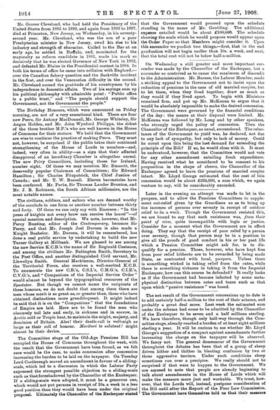On Wednesday a still greater and more important sur- render
was made by the Chancellor of the Exchequer, but a surrender so contrived as to cause the maximum of discredit to the Administration. Mr. Barnes, the Labour Member, made a striking appeal to the Government not to insist upon the reduction of pensions in the case of old married couples, but to let them, when they lived together, draw as much as they would if they lived apart. To begin with Ministers remained firm, and put up Mr. McKenna to argue that it would be absolutely impossible to make the desired concession. The Government were governed by the financial conditions of the day : the means at their disposal were limited. Mr. McKenna was followed by Mr. Long and by other speakers, who strongly urged the policy of concession. Then the Chancellor of the Exchequer, as usual, surrendered. The reluc- tance of the Government to yield was, he declared, not due to any lack of sympathy, but only to lack of money. Could he count upon this being the last demand for extending the principle of the Bill? If so, he would close with it. It must be understood, however, that the Committee would not vote for any other amendment entailing fresh expenditure. Having received what he considered to be consent to his proposition in the shape of cheers, the Chancellor of the Exchequer agreed to leave the pensions of married couples intact. Mr. Lloyd George estimated that the cost of this concession would be about 2334,000, a sum which, we again venture to say, will be considerably exceeded.






















































 Previous page
Previous page